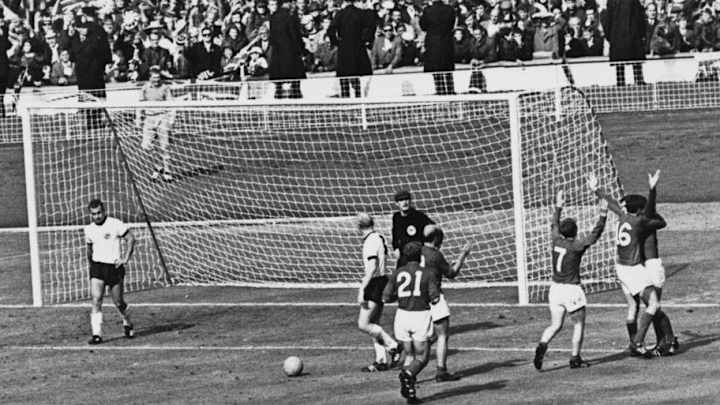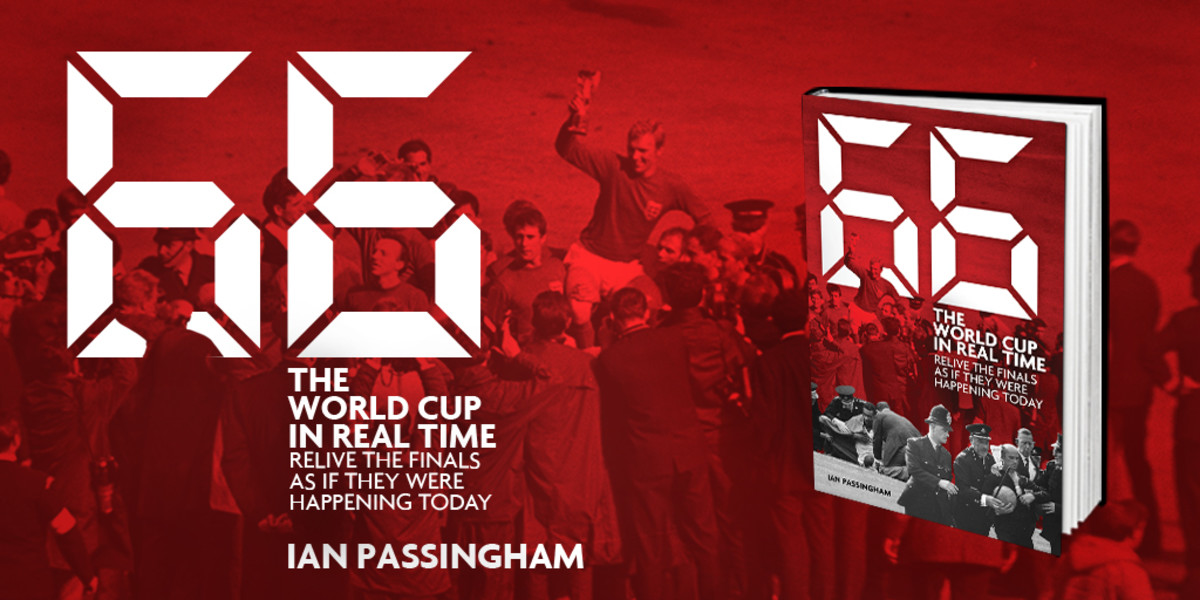World Cup Countdown: 13 Weeks Ago - How the 1966 Tournament Changed Football & FIFA Forever

Ian Passingham, author of 66: The World Cup In Real Timepublished byPitch Publishing, examines the legacy of the 1966 World Cup finals in England when a series of controversies on and off the field helped shape the future of modern football.

England gave the world football. In 1966, England gave football a World Cup which almost destroyed FIFA and changed the game forever.
The summer of ’66 is fondly remembered in England as the year when football came ‘home’ and the nation credited with inventing the game finally won the ultimate prize.
More significantly, though, it was also the year when bitter divisions which were bubbling under the surface of the global game came home to roost in an explosive dispute which threatened FIFA’s very existence.
FIFA would not face such a grave crisis again until 2015, when a corruption scandal brought down top officials including Sepp Blatter. And even that can be traced right back to around 5pm on Saturday, July 23, 1966, when the final whistle blew on that day’s World Cup quarter finals and a bitter dispute erupted between FIFA and its South American members.
DID YOU KNOW 🤔
— FIFA World Cup (@FIFAWorldCup) March 21, 2018
England 1966 was the first #WorldCup to have a mascot 🦁
World Cup Willie’s success ensured he became a pioneer for mascots at major sporting events 🙌#WednesdayWisdom pic.twitter.com/qvkBGIiapW
Today’s FIFA bears little resemblance to the fledgling organisation it was in 1966. Back then, Europe was the dominant political power and, although the myth of England being masters of football had been shattered by abject failures in four World Cup appearances since 1950, the English FA was an influential player off the field.
In August, 1960, England won the right to stage the 1966 finals – beating West Germany in the vote – and the following year, FA Secretary Sir Stanley Rous became FIFA President.
Rous was re-elected three days before the 1966 finals, but behind the scenes there was an air of suspicion between the South Americans and Europeans when the tournament kicked off.
In England, the likes of Argentina and Uruguay were stereotyped as having a volatile temperament and being prone to foul play and bad sportsmanship.
In turn, the South Americans felt the English looked down on them and that the style of European football was overly physical to the point of being violent. Refereeing standards differed wildly, with the South Americans feeling European officials turned a blind eye to tackles which would never be allowed in their game.
The first signs of a major European-South American falling-out came in the group stages as Argentina had Jose Albrecht sent off by Yugoslavian referee Konstantin Zecevic in a brutal goalless draw with West Germany. FIFA warned the Argentine FA about their players’ conduct.
Brazil, champions in 1958 and 1962 and favourites in 1966, were incensed over the lack of protection given to Pele by English referee George McCabe as Portugal knocked them out. The superstar of world football, who had already suffered some vicious treatment against Bulgaria in a match officiated by a West German, was cynically kicked out of the tournament by the Portuguese.
🌧🌧🌧
— FIFA Fussball-Weltmeisterschaft (@fifaworldcup_de) March 13, 2018
🇧🇷🇧🇷🇧🇷
🏃🏾♂️🏃🏾♂️🏃🏾♂️#TuesdayTraining mit @Pele bei der FIFA WM 1966 in England🏴. pic.twitter.com/QDdVaXR8k7
Former France star Just Fontaine - who scored a record 13 goals at the 1958 finals - was in England for the ’66 tournament and described Pele’s treatment as “a crime against football”.
As shell-shocked Brazil headed home, their long time team physician Dr Hilton Gosling complained: “The team has received more injuries in the eight days they have been in England than in the previous eight years.”
The bomb was primed and, on quarter final day, it exploded. FIFA appointed West German referee Rudolf Kreitlein for the England-Argentina tie and Englishman Jim Finney to officiate West Germany vs. Uruguay. Given the underlying mood of suspicion, the appointments were, at best, naïve.
In two ill-tempered matches, the Germans won 4-0 at Hillsborough after Finney sent off two Uruguayans, while England sneaked through 1-0 after Argentine captain Antonio Rattin was dismissed by Kreitlein for dissent.
Rattin claimed he was asking for an interpreter. Kreitlein bizarrely explained he had sent him off for the way he looked at him.
“I couldn’t understand Rattin. I do not speak Spanish, but the look told me everything.”
There were ugly clashes as the teams left the pitch and England manager Alf Ramsey’s post-match interview in which he branded Argentina “animals” poured petrol on the fire.
In Sheffield, meanwhile, the Uruguayans were also crying foul after a match which saw police officers coming on to the pitch to escort Hector Silva away after his sending off. Coach Ondino Viera vowed: “We will never play in England again.”
The Uruguayan mood was summed up when two Sheffield schoolchildren got autographs from players after the game – only to find the messages they had written in Spanish translated as “The referee is a thief” and “German thieves stole the game”.
Sepp #Maier#GermanGK 🇩🇪
— PSiN GoalkeepersBorn ⭐️ (@PortieriSiNasce) April 18, 2017
With Bernd #Patzke, Franz #Beckenbauer, Friedel #Lutz in 1966. pic.twitter.com/PqxT5oXV5o
When FIFA top brass met in Kensington the following day, they decided Argentina were guilty of “flagrant breaches of the laws of the game and showing disregard for discipline and good order”.
They imposed the maximum possible fine of £8 6s 8d and said Argentina would be banned from the next World Cup unless they gave a guarantee over their behaviour. Argentine FA President Dr Fernando Menendez Behety said it was “impossible to give such a guarantee in advance” and claimed the players “were provoked by the referee. He was absolutely biased in favour of England.”
Much of the anger was directed towards Rous, an old-school administrator the South Americans felt represented the stuffy and arrogant attitude of European top brass within FIFA. Juan Santiago, leader of the Argentine World Cup delegation, sneered:
“Words cannot express my anger. If we are refused entry to the next World Cup, Sir Stanley Rous is rather a moron.”
At a hastily arranged emergency meeting in London of the South American Football Confederation, representatives from Brazil, Argentina, Uruguay, Chile, Bolivia, Venezuela and Peru discussed the FIFA sanctions against Argentina and what they perceived as bias in the appointment of European referees for certain matches.
It was agreed that they would consider quitting FIFA and setting up a rival governing body unless the conditional ban on Argentina competing at Mexico '70 was lifted.
Brazilian Confederation of Sport President, Joao Havelange, claimed: “The referees deliberately harmed Brazil, allowing violent play. I felt right from the beginning of the tournament, when I saw how things were going, that traditional football countries like Brazil, Uruguay and Argentina would never reach the final.”
Havelange - a businessman, lawyer and skilful politician who would prove to be a fearsome adversary for Rous - said of the FIFA chief: “Ask him and he will give you the final result of the World Cup.”
England v West Germany
— Superb Footy Pics (@SuperbFootyPics) November 27, 2017
1966 World Cup Final
Wembley Stadium pic.twitter.com/ai3iSHsEO8
On the eve of the final between England and West Germany, Rous led crisis talks with South
American delegates and the threat of a ban on Argentina was later lifted. Ironically, they failed to qualify.
Rous later supported Argentina’s successful bid to hold the 1978 finals, but the South Americans hadn't forgotten 1966. Rous was re-elected in 1970, despite a Uruguayan bid to stir up a campaign against him after they complained FIFA had again been biased against them in Mexico.
But it was only a stay of execution. Havelange hadn’t gone away and he had been steadily building support behind the scenes by 1974. He waged a bitter election campaign ahead of the presidency vote in Munich, promising to increase the number of teams at future World Cups and to give developing football nations a bigger share of the growing wealth generated by football.
His campaign, which saw him visit dozens of countries to woo delegates, was unprecedented. He won support in confederations such as Africa and Asia and, combined with backing from the South Americans, he swept into office as the first non-European President. Rous simply couldn’t compete.
FIFA had changed forever in a revolution which had its roots in 1966. Havelange reigned for 24 years, delivering on his election promises. The number of teams at the World Cup finals became 24 in 1982 and then 32 in 1998. The Rous regime had fiercely resisted commercialisation. Havelange signed up major sponsors and money rolled in from TV rights.
Sir Stanley Rous, the President of @FIFAcom is ready to preside over the 1966 World Cup Finals draw. pic.twitter.com/TbMvaPaEzb
— 50 Years of Hurt (@66WorldCup) January 6, 2016
There were changes on the field, too. South American concerns about physical play – particularly the tackle from behind – and differences in refereeing styles were gradually addressed and today’s football, which borders on being a non-contact sport, is another development which can be traced back to 1966.
When Havelange finally stepped down, his protégé, Blatter, kept FIFA on the same path. And, with the European proportion of FIFA’s membership falling from around half to a third, it was easy for the other federations to keep Europe at heel and the less scrupulous among the FIFA ranks had had a huge financial incentive to keep the status quo and the gravy train rolling.
Few could have predicted when Bobby Moore lifted the Jules Rimet Trophy how England’s fortunes would wane on and off the field. ’66 and all that? The ‘all that’ still resonates today and if England ever hosts a World Cup again, it will certainly be a very different experience to that golden summer 52 years ago.
Who knows what the late Sir Stanley Rous would have made of it all?
